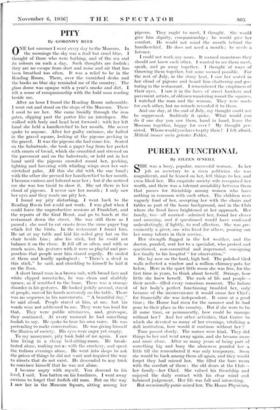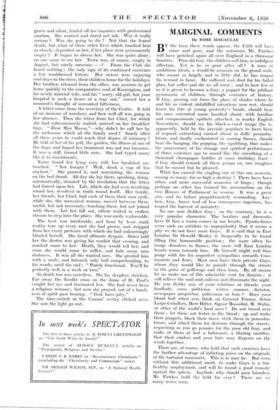PURELY FUNCTIONAL
By EILEEN O'NEILL
Her strength flagged in the hot weather, and the doctor, puzzled, sent her to a specialist, who probed and questioned, non-committal and impersonal, consigning her finally to his hospital " for observation."
She lay now on the hard, high bed. The polished tiled walls reflected a window and a million chimney-pots far below. Here in the quiet little room she was free, for the first time in years, to think about herself. Strange, how little she knew herself. The rush of life and people— their needs—filled every conscious moment. The failure of her body's perfect functioning troubled her, only because of the inconvenience it would cause her Chief ; for financially she was independent. It came at a good tine ; the House had risen for the summer and he had gone to their place in the country. But if she were to be ill some time, or permanently, how could he manage without her ? And her other activities, that Centre to which she devoted so many of her evenings, vitalising a dull institution, how would it continue without her ?
Time passed slowly. The nurses were kind. They did things to her and went away again, and she became more and more alone. After so many years of being part of something big and busy the aloneness puzzled her a little till she remembered it was only temporary. Soon she would be back among them all again, and they would forget they had missed her. She filled the bare room with the comfort of them : the old dears at the Club— her family—her Chief. She valued his friendship and enjoyed the daily contact with his clear mind and balanced judgement. Her life was full and interesting.
But occasionally panic seized her. The House Physician, grave and silent, fended off her inquiries with professional caution. She worried and dared not ask. Was it really serious ? Was she going to die ? Not that she feared death, but what of those other lives which touched hers so closely, depended on her, if her place were permanently empty ? It began to obsess her. She was quite alone ; no one came to see her. Town was, of course, empty in August, but surely someone---? From the Club she .heard nothing ; the only sign of its continued existence a few readdressed letters. Her sisters were enjoying cool days on the river, their children home for the holidays. Her brother, released from the office, was anxious to get home quickly to the comparative cool of Kensington, and his newly married wife, and his " sorry, old girl, but your hospital is such a deuce of a way out," caused her a moment's thought of unwonted bitterness. A letter came from the secretary of the Centre. It told of an increase of numbers, and how well all was going in her absence. Then the letter from her Chief, for which she had subconsciously waited, arrived on her breakfast tray. " Dear Miss Mason,"—why didn't he call her by the nickname which all the family used ? Surely after all these years he could reach that degree of intimacy ? He told of her of his golf, the garden, the illness of one of the dogs, and hoped her treatment was not too tiresome. It was a stiff, formal little note. She had typed many like it to constituents.
Nurse found her lying very still, her breakfast . un- touched. " Not hungry ? Well, drink a cup of tea anyhow." She poured it, and unresisting, the woman on the bed drank. All day she lay there, speaking, doing, automatically, stunned by the revelation that the letter had forced upon her. Life, which she had seen revolving round her, revolved in truth round itself. Her family, her friends, her Chief, had each of them their Own cycle, while she, the unwanted woman, moved between them, useful, blit not necessary; touching them, but not joined with them. Let her fall out, others waited in endless stream to step into the place. She was easily replaceable.
The heat was intolerable, and hour by hour stark reality tore up every root she had grown, and stripped from her every pretence with which she had unknowingly blinded herself. She faced ultimate despair. Sister told her the doctor was giving his verdict that evening, and comfort came to her. Death, they would tell her, and soon she would cease to suffer, and fade away into darkness. It was all she wanted now. She greeted him with a smile, and listened, only half comprehending, to his words, until the end : " Purely functional. You'll be perfectly well in a week or two."
So death too was merciless. She lay sleepless, stricken. Far away the floodlit cross on the dome of St. Paul's caught her .eye and fascinated her. She had never been a religious woman ; but now she prayed, out of a loneli- ness of spirit past bearing. " God, have pity."
The time-switch in the Canons' vestry clicked over. She saw the light go out.















































 Previous page
Previous page